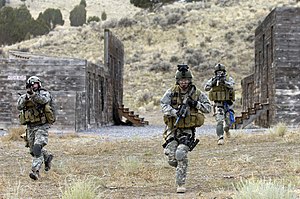Camp Williams
| Camp W. G. Williams | |
|---|---|
| South of Riverton, Utah | |
 Soldiers from the 19th Special Forces Group conduct training at Camp Williams | |
| Coordinates | 40°26′15″N 111°55′32″W / 40.4375°N 111.9255°W |
| Site information | |
| Controlled by | Utah Army National Guard |
| Open to the public | No |
| Site history | |
| Built | 1928 |
| In use | 1928–present |
Camp W. G. Williams, commonly known as Camp Williams, also known as Army Garrison Camp Williams, is a National Guard training site operated by the Utah National Guard. It is located south of Bluffdale, west of Lehi, and north of Saratoga Springs and Cedar Fort, approximately 25 miles (40 km) south of Salt Lake City, straddling the border between Salt Lake County and Utah County in the western portion of the Traverse Mountains. Camp Williams is also home to the Non-Commissioned Officer's Warrior Leader Course, which is taught to Active, National Guard, and Reserve components.
Camp Williams land comprises about 6 square miles (16 km2) of flat area and 47 square miles (120 km2) of mountainous region.
History
The Utah Army National Guard traces its beginnings to the Utah Territorial Militia, known as the Nauvoo Legion. The Nauvoo Legion operated similarly to militias in other states and territories, including requiring adult men—between the ages of 18 and 45—to serve. The militia served as guardians of the Central Overland Route, and in the Utah War, Black Hawk War and Walker War. During this period the legion's various units had annual musters and training camps, with Lehi's unit often doing so near the site of today's Camp Williams. During a power struggle between the Federal government of the United States and The Church of Jesus Christ of Latter-day Saints, the militia was abolished in the Edmunds–Tucker Act of 1887.
By March 1894 conflicts had settled down, and the Utah Territorial Legislature authorized Caleb Walton West, the Governor, to establish The National Guard of Utah. Twenty years later, in 1914 and 1915, US president Woodrow Wilson, set aside 18,700 acres to provide permanent training grounds for the guard. This was the first official designation of land that would comprise Camp Williams. This original land makes up the western majority of the current site, which is rough and rugged, and lacked flat land for a cantonment area (headquarters and camp). So the State of Utah rented nearby flatter land, and then later purchased it to build a cantonment area. Permanent use of the area, including buildings, was not established at this time, due to World War I, and the site was just occasionally used until the 1920s. In both 1926 and 1927 the guard's annual encampment was held at the site, and in 1928 the camp was officially established for permanent use as Camp W.G. Williams. It was named after Brigadier General W. G. Williams in recognition of his war participation since the Spanish–American War and his work in establishing the site as a permanent training location.
Machine Gun Fire

On 19 September 2010, live fire .50-caliber machine gun training at the camp sparked the "Machine Gun Fire" that resulted in over 3,500 acres burned and the loss of three homes in the city of Herriman to the north.[1]
Utah Data Center
From 2011 to 2013, the National Security Agency (NSA) built a US$1.5 billion Community Comprehensive National Cybersecurity Initiative Data Center at Camp Williams, the first in a series of data centers required for the Comprehensive National Cybersecurity Initiative.[2][3][4] The 1,500,000 square feet (140,000 m2) facility is built on 200 acres (81 ha) where Camp Williams' former airfield was located on the west side of Utah Highway 68. It is expected to store 1 yottabyte of data by 2015.[5][6][7] The facility will use 65 megawatts of electricity and will cost another $2 billion for hardware, software, and maintenance.[5]
This facility will greatly increase the NSA's ability to store and process millions of emails, IMs, SMS, and phone calls made daily by people around the world and in the United States.[8]
See also
- List of military installations in Utah
- Camp Williams Hostess House/Officers' Club, listed on the National Register of Historic Places
References
- ^ Bergreen, Jason; Mike Gorrell, and Nate Carlisle (20 September 2010). "Guard takes blame for massive fire, saying 'we failed'". Salt Lake Tribune. MediaNews Group. Retrieved 21 September 2010.
{{cite news}}: CS1 maint: multiple names: authors list (link) - ^ LaPlante, Matthew D. (2 July 2009). "New NSA center unveiled in budget documents". Salt Lake Tribune. MediaNews Group. Retrieved 5 July 2009.
- ^ LaPlante, Matthew D. (2 July 2009). "Spies like us: NSA to build huge facility in Utah". Salt Lake Tribune. MediaNews Group. Retrieved 5 July 2009.
- ^ Fidel, Steve. "Utah's $1.5 billion cyber-security center under way". Deseret News. Retrieved 6 January 2011.
- ^ a b Kenyon, Henry (7 January 2011). "New NSA data center breaks ground on construction – Defense Systems". Defense Systems. Retrieved 11 August 2011.
- ^ "NSA to store yottabytes in Utah data centre". CNET Networks. Retrieved 11 August 2011.
- ^ Bamford, James. "Who's in Big Brother's Database?". The New York Review of Books. Retrieved 11 August 2011.
- ^ Bamford, James (15 March 2012). "The NSA Is Building the Country's Biggest Spy Center (Watch What You Say)". Wired.com. Retrieved 18 March 2012.
External links
